Books
The most recent book reviews are at the top. When an older review is added, it will be in reverse chronological order (lower on the page) but temporarily marked "NEW" so that you can spot it. In case a review might be removed from the original source, an "archived" copy may be saved on this website, with a link from this page.
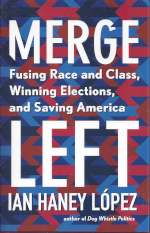 |
[Below] Examples from the book cover:
- "Understanding how to counteract the conservative playbook on race...is the great challenge of political strategy today. It has also been the determined, prescient and indispensably productive pursuit of Ian Haney Lopez for decades."
— RASHAD ROBINSON, president, Color Of Change
- "Cross-racial solidarity is the Holy Grail of progressive politics. Merge Left makes the best case yet for how to finally achieve it as the route to racial and economic justice."
— HEATHER McGHEE, distinguished senior fellow, Demos and Demos Action
|
Description of Merge Left: Fusing Race and Class, Winning Elections, and Saving America, by Ian Haney Lopez (published 2019)
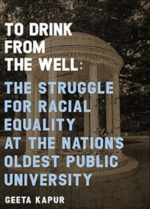 |
[Below] "Nearly 300 people attended our 'Reflections on Critical Race Theory' event with the author of To Drink From the Well: The Struggle for Racial Equality at the Nation's Oldest Public University, Geeta Kapoor, and Christian Nunes, President of NOW.
Purchase To Drink from the Well: The Struggle for Racial Equality at the Nation's Oldest Public University. The publisher's discount will be in effect until December 31st. The discount code to enter at checkout is NOW10. |
Video: "Reflections on Critical Race Theory" event, Center for Common Ground, December 15, 2021
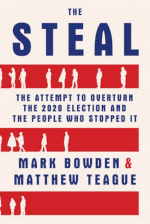 |
[Below] "The following is an excerpt from The Steal: The Attempt to Overturn the 2020 Election and the People Who Stopped It, by Mark Bowden and Matthew Teague which will be published by Atlantic Monthly Press on January 4th. The book records the story of what happened in the six swing states—Arizona, Georgia, Michigan, Nevada, Pennsylvania and Wisconsin—between November 3rd and January 6th through the eyes of participants on both sides, those who believed there was widespread voter fraud and those who after investigating claims of irregularities and finding no evidence of widespread voter fraud defended the election results. It is based on original interviews conducted by the authors and the team of researchers and reporters who worked on the book, as well as public records, court testimony, and open legislative hearings." |
"Stealing Georgia: Trump Gets Desperate, Kanye’s Publicist Shows Up on Ruby Freeman’s Doorstep, and… 28,000 Missing Votes?" By Mark Bowden and Matthew Teague, Literary Hub, December 4, 2021
 |
[Below] This is a review of the book Ten Year War: Obamacare and the Unfinished Crusade for Universal Coverage, by Jonathan Cohn.
"Cohn shows how repeated failures by both Democrats and Republicans to get a decent policy through our rickety 18th-century constitutional structure led to the strategy that produced Obamacare, formally known as the Affordable Care Act—a policy that improved our system in many ways but also entrenched some of its worst elements. For advocates of universal health care of any political stripe, Cohn’s book is essential reading." |
"Pain Machine: Why our health care system is broken." By Ryan Cooper, The Nation, November 28, 2021
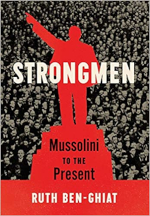 |
NEW! [Below] This is a review of the book Strongmen: Mussolini to the Present, by Ruth Ben-Ghiat.
"This terrific history of strongmen since Mussolini makes it clear that despite a horrific pandemic and massive economic disruption, ordinary democratic Americans have more to be thankful for this Thanksgiving than ever before.
"Comparing the gruesome, granular details of the reigns of Mussolini, Franco, Hitler, Gaddafi, Pinochet, Mobuto, Berlusconi and Erdoğan to the acts and aspirations of Donald Trump, New York University professor Ruth Ben-Ghiat makes a powerful argument that on the scary road to fascism, America just came perilously close to the point of no return.
"Almost everything Trump has done has come straight from the authoritarian playbook...." |
"Strongmen review: a chilling history for one nation no longer under Trump." By Charles Kaiser, The Guardian, November 26, 2020. (Interview with the author here.)
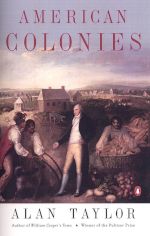
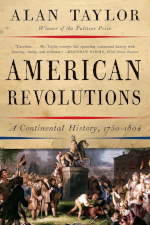
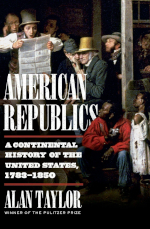 |
NEW! [Below] From the article:
"...much of the soundest scholarship on our history remains largely inaccessible to lay readers—either sequestered away from the general public behind academic paywalls or too dense and dry to hold the interest of broad nonacademic audiences. Alan Taylor, a professor of history at the University of Virginia and a two-time winner of the Pulitzer Prize, isn’t among the historians who have prominently utilized social media and other platforms to open up that work in recent years. But he has written three highly accessible introductions to early American history that belong on every American bookshelf: 2001’s American Colonies, on the European arrivals to the New World and the Colonial era; 2016’s American Revolutions, on the Revolutionary War; and this year’s American Republics, which covers the early republic from the end of the war through the Compromise of 1850. Their power lies not in the provision of a tidy counternarrative to our cherished national myths, but in their suggestion that we can afford to dispense with sweeping narratives altogether—that we can find what we really need from American history in its chaos and contingencies." |
"The Incoherence of American History." By Osita Nwanevu, The New Republic, August 24, 2021
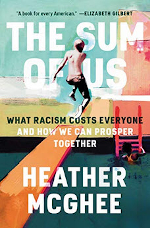 |
[Below] This is a review of the book The Sum of Us: What Racism Costs Everyone and How We Can Prosper Together. An essay here on this website is adapted from this book.
"Heather McGhee's compassionate but cleareyed book argues that divide-and-conquer tactics have left all Americans worse off." |
"'The Sum of Us' Tallies the Cost of Racism for Everyone." By Jennifer Szalai, New York Times, February 23, 2021
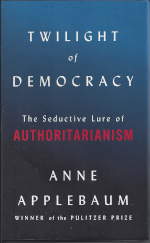 |
[Below] "For Applebaum, the question is how her peers—all of whom, at the turn of the century, supported 'the pro-European, pro-rule-of-law, pro-market' consensus that dominated not only center-right but also most center-left politics after the fall of communism—have come to avow reactionary conspiracy theories, anti-Semitism, and xenophobia and to show a slavish loyalty to demagogues like Donald Trump and Viktor Orbán. Twilight of Democracy is her attempt at an answer; in other words, it is Applebaum’s effort to explain why so many of her once-close friends have turned out to be fascists.
"Insofar as the book offers intimate portraits of the sorts of intellectuals who have ended up working to empower the far right, it’s a valuable document. Drawing inspiration from Julien Benda’s The Treason of the Intellectuals, Applebaum makes explicit that she is not setting out to explain what makes today’s populist strongmen tick nor what makes ordinary voters support them, but specifically why some in her orbit—all highly educated, urbane, cosmopolitan journalists, academics, and political operatives—have joined their cause...." |
"Ex-Friends: Anne Applebaum and the crisis of centrist politics." By David Klion, The Nation, January 11, 2021
NEW! [Below] This is a review of four book on America's far right:
Weaponised Words. By Kurt Braddock.Cambridge University Press; 302 pages.
Oath Keepers. By Sam Jackson.Columbia University Press; 240 pages.
Hate in the Homeland. By Cynthia Miller-Idriss.Princeton University Press; 272 pages.
American Zealots. By Arie Perliger.Columbia University Press; 232 pages.
"Assessing the threat from America’s far right." The Economist, December 10, 2020 edition
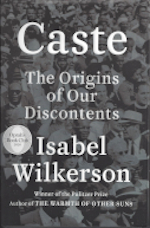 |
NEW! [Below] This is a review of the book Caste: The Origins of Our Discontent. "Isabel Wilkerson compares American racism to structures of oppression in India and Nazi Germany."
From the book: "A caste system is an artificial construction, a fixed and embedded ranking of human value that sets the presumed supremacy of one group against the presumed inferiority of other groups on the basis of ancestry and often immutable traits, traits that would be neutral in the abstract but are ascribed life-and-death meaning in a hierarchy favoring the dominant caste whose forebears designed it. A caste system uses rigid, often arbitrary boundaries to keep the ranked groupings apart, distinct from one another and in their assigned places.
"Throughout human history, three caste systems have stood out. The tragically accelerated, chilling, and officially vanquished caste system of Nazi Germany. The lingering, millennia-long caste system of India. And the shape-shifting, unspoken, race-based caste pyramid in the United States. Each version relied on stigmatizing those deemed inferior to justify the dehumanization necessary to keep the lowest-ranked people at the bottom and to rationalize the protocols of enforcement. A caste system endures because it is often justified as divine will, originating from sacred text or the presumed laws of nature, reinforced throughout the culture and passed down through the generations....
"The anthropologist Ashley Montagu was among the first to argue that race is a human invention, a social construct, not a biological one, and that in seeking to understand the divisions and disparities in the United States, we have typically fallen into the quicksand and mythology of race. 'When we speak of the race problem in America,' he wrote in 1942, 'what we really mean is the caste system and the problems which that caste system creates in America....'
"A caste system has a way of filtering down to every inhabitant, its codes absorbed like mineral springs, setting the expectations of where one fits on the ladder. 'The mill worker with nobody else to look down on regards himself as eminently superior to the Negro,' observed the Yale scholar Liston Pope in 1942. 'The colored man represents his last outpost against social oblivion.' |
"Is America Trapped in a Caste System?" By Gaiutra Bahadur, The New Republic, November 25, 2020
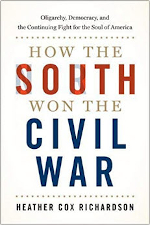 |
[Below] This is a review of the book How the South Won the Civil War: Oligarchy, Democracy, and the Continuing Fight for the Soul of America, by Heather Cox Richardson, Oxford, 272 pp.
"...Throughout American history, she contends, the forces of oligarchy and democracy have been involved in a mortal struggle for the nation's future, and she wants to show how the visions of oligarchy have often won out—how, in other words, we got from the era of emancipation and Confederate defeat to the presidency of Donald Trump.... Arguing that the slaveholders' idea of an oligarchic America triumphed with the growth of the second American oligarchy in the latter half of the 20 century, Richardson shows how the rise of movement conservatism, as personified by Barry Goldwater in his 1964 presidential campaign, came to embody this vision of an oligarchic America. The new oligarchy's triumph—one that combined economic domination with racial inequality*—lay in a political alliance between the South and the West, Richardson argues, and in the Republican presidencies of Richard Nixon, Ronald Reagan, the Bushes and finally Trump...."
* Editor: To more readily defend a hierarchy with oligarchs at the top, they needed someone at the bottom of the hierarchy whom enough white working class voters—otherwise at the bottom—could be persuaded to see as lower than themselves, rather than turning their ire upward against the oligarchs. Demonizing African-Americans served that need. |
"The Oligarchs' Revenge: The making of the modern right." By Manisha Sinha. The Nation, October 19/26, 2020
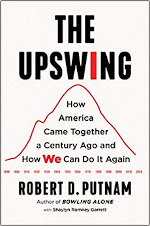 |
[Below] This is a review of the book The Upswing: How America Came Together a Century Ago and How We Can Do It Again. "...If Alexis de Tocqueville, who chronicled the flowering of American democracy in the 1830s, were transported into the present, the authors imagine, this is what he would see: an inordinate and grotesque segregation of the population by class; an economy ruled by corporate monopolies, gaining ever-greater power through mergers and acquisitions; workers powerless to negotiate for themselves amid the suppression of labor unions; and reckless corporate manageers whose only aim is to make money for their shareholders, acting with little or no regard for any public interest. He would see the transmutation of corporate financial power into inordinate political power, undermining the machinery of democracy and leading to a pervading disillusionment among the citizenry....
"...The problems that we face today are the same challenges that confronted the first era of Progressive reform more than a century ago.
"Between the first Gilded Age and ours, The Upswing proposes, there was a lengthy period—almost three-quarters of century—in which these trends were headed in the opposite direction.... ...[I]f the first Progressives of the early twentieth century could reverse the course of history as they did, the authors contend, we of the early twentieth-first century can do the same...." |
"From I to We: Robert Putnam and Shaylyn Romney Garrett’s vision for a new civic community." By Win McCormack, The New Republic, October 2020 issue. [Archived in PDF format for ease of highlighting]
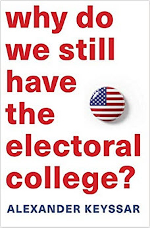 |
[Below] This is a review of the book Why Do We Still Have the Electoral College? by Alexander Keyssar.
"We Americans live in a debased version of democracy in which basic parts of the federal government betray, by design, the principle of majority rule....
"One of the chief virtues of Alexander Keyssar’s remarkable new book Why Do We Still Have the Electoral College? is that it conclusively demonstrates the absurdity of preserving an institution that has been so contentious throughout US history and has not infrequently produced results that defied the popular will....
"...To tell his story, Keyssar has crafted an absorbing, if dispiriting, narrative about the durable obstacles to structural change in the United States....
"...Keyssar reveals throughout his book how complex historical wisdom can be. Rarely does he offer just a single explanation for why the various efforts to reform the Electoral College or do away with it have failed to gain the necessary votes in Congress or why, for years at a stretch, their proponents saw little point in trying. The impression he leaves is of a polity in which incremental moves that enhance democracy, like the Voting Rights Act, are possible, while efforts to cure the fundamental infirmities of the system keep coming up against such barriers as the “balance of power between the states and the national government”—which are encrusted with centuries of jurisprudence and defended by politicians whose power might be threatened by change....
"But because there has never been an insurgency to demand a national popular vote, the Americans who keep straining to push that rock up the steep constitutional hill are nearly all politicians, academics, and journalists. Few ordinary voters care enough about how the president gets elected to organize around the issue...." |
"The Creaky Old System." By Michael Kazin, The Nation, September 22, 2020
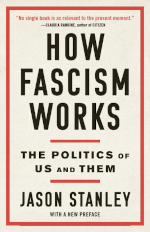 |
NEW! [Below] This is a review of the book How Fascism Works: The Politics of Us and Them by Jason Stanley.
"One of the insidious ironies of fascist politics, the philosopher Jason Stanley writes in his arresting new book, is that talk of fascism itself becomes more difficult because it is made to seem outlandish.
"The normalization of the fascist myth 'makes us able to tolerate what was once intolerable by making it seem as if this is the way things have always been', Stanley writes. 'By contrast the word ‘fascist’ has acquired a feeling of the extreme, like crying wolf.'
"The assertion that immigrants are responsible for social ills that threaten to ruin a once-great nation, for example, might represent run-of-the-mill racism or xenophobia. His book’s subtitle is after all 'The Politics of Us and Them.' But the idea is also drawn from a blueprint shared by the most robust fascistic regimes in recent history....
"The book provides a fascinating breakdown of the fascist ideology, nimbly interweaving examples from Germany, Italy and Hungary, from Rwanda and Myanmar to Serbia and, yes, the US. As he proceeds through his framework of the broadest features of his subject, Stanley includes smaller observations that may for some readers land bracingly close to home." |
"How Fascism Works review: a vital read for a nation under Trump." By Tom McCarthy, The Guardian, October 15, 2018
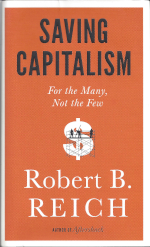 |
NEW! [Below] CAPITALISM: From the book, pp. 8-9:
"A market—any market—requires that government make and enforce the rules of the game. In most modern democracies, such rules emanate from legislatures, administrative agencies, and courts. Government doesn't 'intrude' on the 'free market.' It creates the market....
"In order to have a 'free market,' decisions must be made about
- PROPERTY: what can be owned
- MONOPOLY: what degree of market power is permissible
- CONTRACT: what can be bought and sold and on what terms
- BANKRUPTCY: what happens when purchasers can’t pay up
- ENFORCEMENT: how to make sure no one cheats on any of these rules
"…Many of these decisions are far from obvious and some of them change over time, either because social values change (think of slavery), technologies change (patents on novel arrangements of molecules), or the people with power to influence these decisions change (not just public officials, but the people who got them into their positions).
"These decisions don’t ‘intrude’ on the free market. They constitute the free market. Without them there is no market." |
Book review: "Saving Capitalism: For the Many, Not the Few." Kirkus Reviews, July 27, 2015
"Book Review: Saving Capitalism: For the Many, Not the Few." 21st Century Social Justice, Fordham University, August 15, 2017
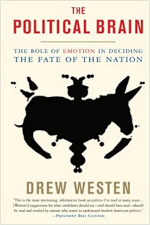 |
NEW! [Below] [From 2008:] "The Political Brain is a groundbreaking investigation into the role of emotion in determining the political life of the nation. For two decades Drew Westen, professor of psychology and psychiatry at Emory University, has explored a theory of the mind that differs substantially from the more 'dispassionate' notions held by most cognitive psychologists, political scientists, and economists -- and Democratic campaign strategists. The idea of the mind as a cool calculator that makes decisions by weighing the evidence bears no relation to how the brain actually works. When political candidates assume voters dispassionately make decisions based on 'the issues,' they lose. That's why only one Democrat has been re-elected to the presidency since Franklin Roosevelt -- and only one Republican has failed in that quest.
"In politics, when reason and emotion collide, emotion invariably wins. Elections are decided in the marketplace of emotions, a marketplace filled with values, images, analogies, moral sentiments, and moving oratory, in which logic plays only a supporting role. Westen shows, through a whistle-stop journey through the evolution of the passionate brain and a bravura tour through fifty years of American presidential and national elections, why campaigns succeed and fail. The evidence is overwhelming that three things determine how people vote, in this order: their feelings toward the parties and their principles, their feelings toward the candidates, and, if they haven't decided by then, their feelings toward the candidates' policy positions.
"Westen turns conventional political analyses on their head, suggesting that the question for Democratic politics isn't so much about moving to the right or the left but about moving the electorate. He shows how it can be done through examples of what candidates have said -- or could have said -- in debates, speeches, and ads. Westen's discoveries could utterly transform electoral arithmetic, showing how a different view of the mind and brain leads to a different way of talking with voters about issues that have tied the tongues of Democrats for much of forty years -- such as abortion, guns, taxes, and race. You can't change the structure of the brain. But you can change the way you appeal to it. And here's how. |
"The Political Brain: The Role of Emotion in Deciding the Fate of the Nation." By Drew Weston. Paperback – May 6, 2008. Book description from Amazon.com
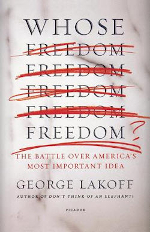 |
NEW! [Below] "Freedom’s just another word for ... well, completely different worldviews, according to George Lakoff's new book, Whose Freedom?, and these differences are often unrecognized by progressives, making it nearly impossible to fight that right-wing mind machine the author dissects in detail in his newest book....
"The renowned progressive linguist begins his analysis of the differences between conservative and progressive definitions of freedom with the assertion that until the rise of the modern right wing, there was indeed a near-universal acceptance of what freedom means to American citizens. He points to a history of slow but consistent expansion and inclusion of more categories of people legally empowered by the term, from the outlawing of slavery, to granting voting rights to African Americans and women, to FDR’s insistence that economic security is more than just a desirable condition for the exercise of rights. To be sure, progress has often been unsteady in practice and uneven in application, but the progressive trend is unmistakable from even the most cursory look at our past....
"How is this pool of pragmatists being shrunk? By consciously redefining what Americans mean when they use the term, 'freedom,' Lakoff maintains...." |
"Book Review: George Lakoff's 'Whose Freedom?'" By Susan Gardner, Daily Kos, May 20, 2007
|

















